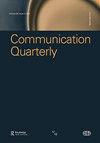The relationship of student-to-student confirmation in the classroom to college students’ mental health and well-being
IF 1
Q2 COMMUNICATION
引用次数: 9
Abstract
ABSTRACT The purpose of this study was to examine the impact of student-to-student confirmation on college students’ self-reported mental health and well-being. It was proposed that confirming messages work to reduce indicators of mental illness (i.e., depression, stress, and anxiety), which in turn affect students’ mental health (i.e., psychological well-being). College students (N = 412) completed a survey questionnaire. Results of correlational and mediation analyses indicate that student-to-student confirmation is related to psychological well-being as well as indicators of mental illness (i.e., depression). Self-reported depression symptoms mediated the relationship between all three dimensions of student-to-student confirmation and psychological well-being. This study contributes to the growing conversation of college student mental health and its relation to the teaching-learning process, as well as contributing to the theoretical understanding of confirmation in the college classroom.学生课堂确认与大学生心理健康和幸福感的关系
摘要本研究的目的是检验学生对学生的确认对大学生自我报告的心理健康和幸福感的影响。有人提出,确认信息可以减少心理疾病(即抑郁、压力和焦虑)的指标,而这些指标反过来又会影响学生的心理健康(即心理健康)。大学生(N=412)完成了一份调查问卷。相关和中介分析的结果表明,学生对学生的确认与心理健康以及精神疾病(即抑郁症)的指标有关。自我报告的抑郁症状介导了学生对学生的确认和心理健康的所有三个维度之间的关系。本研究有助于深入探讨大学生心理健康及其与教学过程的关系,也有助于对大学课堂确认的理论理解。
本文章由计算机程序翻译,如有差异,请以英文原文为准。
求助全文
约1分钟内获得全文
求助全文

 求助内容:
求助内容: 应助结果提醒方式:
应助结果提醒方式:


